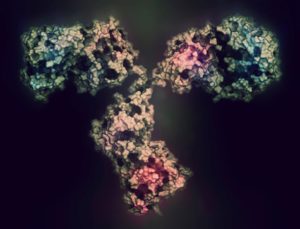Cold agglutinin disease (CAD) is a rare autoimmune disease caused by antibodies directed against red blood cell antigens, making them agglutinate at colder temperatures and activate complement. Current treatments for CAD are limited and include avoiding cold temperatures, inhibiting B-cell production of autoantibodies, and providing transfusions to combat hemolysis. Researchers in Germany recently conducted a non-randomized, phase 2 clinical trial in 13 patients with CAD to test the safety and efficacy of eculizumab—a monoclonal antibody which inhibits complement by binding complement factor C5. Patients received eculizumab weekly for 4 weeks and then biweekly through 26 weeks. While eculizumab did not reduce cold-induced circulatory symptoms, the median lactate dehydrogenase level (indicative of hemolysis) decreased from 572 U/L to 334 U/L (p=0.02) and hemoglobin levels increased from 9.35 g/dL to 10.15 g/dL (p=0.04). Furthermore, the number of RBC units transfused was less than projected—8 patients did not need any transfusions and one additional patient received fewer transfusions than expected. Adverse events (mainly mild or moderate) were reported in 5 patients. Additional studies examining the efficacy of eculizumab for CAD treatment are needed.
Reference:

